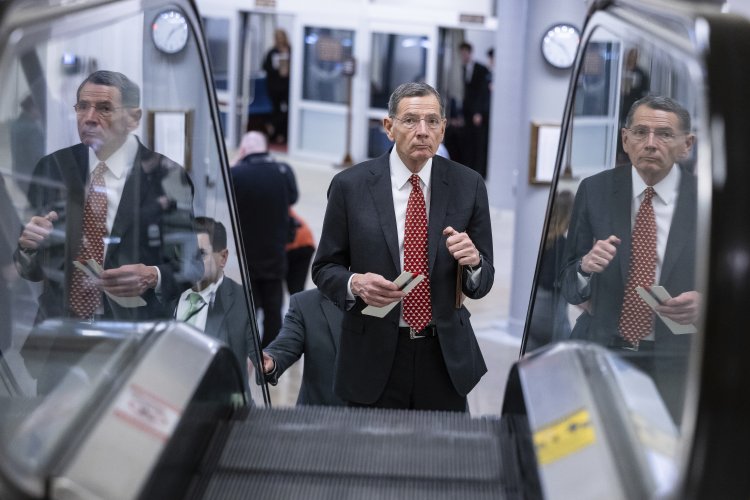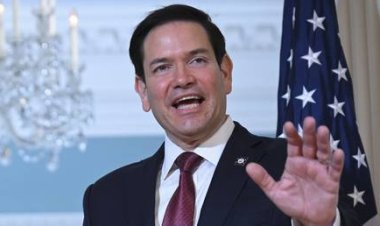Senate Republican Leaders Promise to Proceed with Budget Votes
A final plan may be shared as early as Tuesday night, despite ongoing accounting inquiries and worries from deficit hawks.

This show of confidence followed a closed-door meeting where GOP senators discussed key unresolved issues, particularly how significantly they are willing to reduce federal spending amid concerns from fiscal conservatives regarding leaders' developing plan, which includes only modest deficit-reduction targets in the budget proposal.
“We just keep having the same conversation,” Sen. Kevin Cramer stated as he left the meeting. “But I do think, you know, there's 50 people at least willing to move forward on this portion of it.”
Republican leaders aim to demonstrate forward momentum, and Senate Majority Leader John Thune expressed optimism that the budget framework—a pivotal prerequisite for the GOP’s anticipated party-line bill—will be approved in his chamber this week.
However, several GOP senators indicated they are holding back their support, citing a lack of a final draft of the framework and uncertainty about the strategy being pursued by their leaders. Senate Republicans are looking to circulate a final plan as early as Tuesday night.
“I need to see some text,” Sen. Josh Hawley remarked after lunch.
During the meeting, GOP leaders worked to alleviate concerns about whether House hard-liners would accept the Senate’s more modest deficit-reduction goals or send the proposal back for additional rounds of intense overnight votes. Hawley reported that Senate leaders expressed confidence that the House would accept whatever the Senate sends over.
In the meantime, House leaders are preparing to push through whatever the Senate delivers next week, finalizing the budget blueprint and setting the stage for action on the actual bill that combines tax cuts with border security, increased defense spending, energy incentives, and other measures.
A critical question remains whether Republicans can label the extension of the 2017 tax cuts with a zero-dollar price tag or if they will have to confront the projected cost exceeding $4 trillion.
Republicans have been preparing for weeks to seek clarification from the Senate’s parliamentarian, Elizabeth MacDonough, who has been informally reviewing whether the GOP can employ an accounting tactic known as a “current policy baseline” to mitigate the cost of extending Trump’s tax cuts.
However, some Senate Republicans have begun arguing this week that a formal ruling from MacDonough may not be required. Instead, they believe she could provide informal guidance that the final decision belongs to Senate Budget Chair Lindsey Graham, according to two GOP aides who requested anonymity to discuss private discussions.
During the Tuesday lunch, Republican senators were informed they did not need a formal ruling, as noted by one GOP senator present, and the two top leaders echoed this sentiment afterward.
“We think the law is very clear, and ultimately the budget committee chairman makes that determination,” Thune said. “But obviously, we are consulting regularly with the parliamentarian.”
“It's not a ruling by the parliamentarian,” added Sen. John Barrasso, the No. 2 GOP leader. “The Budget chair gets to decide which baseline to use.”
As recently as Tuesday afternoon, Democrats anticipated a bipartisan meeting hosted by MacDonough to address the tax-scoring issues. A favorable ruling in this context would grant Republicans greater flexibility to implement permanent tax cut extensions while incorporating additional tax measures favored by Trump.
However, Democrats discovered Tuesday evening that the anticipated meeting would not occur. In a subsequent statement, Budget Committee Democrats criticized the GOP's apparent unilateral adoption of the current policy baseline as a "fraud" that "upends decades of precedent, paves the way to add mountains of national debt, and will detrimentally affect the budget reconciliation process." Graham declined to comment.
Regardless of the baseline Republicans ultimately choose, Thune still needs to persuade a handful of fiscal conservatives seeking deeper cuts than the $2 trillion “aspirational” goal currently under discussion in the Senate, which is not expected to be clearly defined in the guidelines provided to its committees.
Instead, Senate GOP leaders intend to pursue a minimal approach, instructing their committees to identify at least a few billion in savings compared to the House’s $1.5 trillion goal for deficit reduction. The fiscal conservatives are advocating for more significant spending cuts to be included in the legislation, with some suggesting targets for deficit reduction as high as $6.5 trillion.
“We’ll have to get that before we move forward,” said Sen. Ron Johnson, who has been an advocate for steeper cuts.
Mark B Thomas for TROIB News












